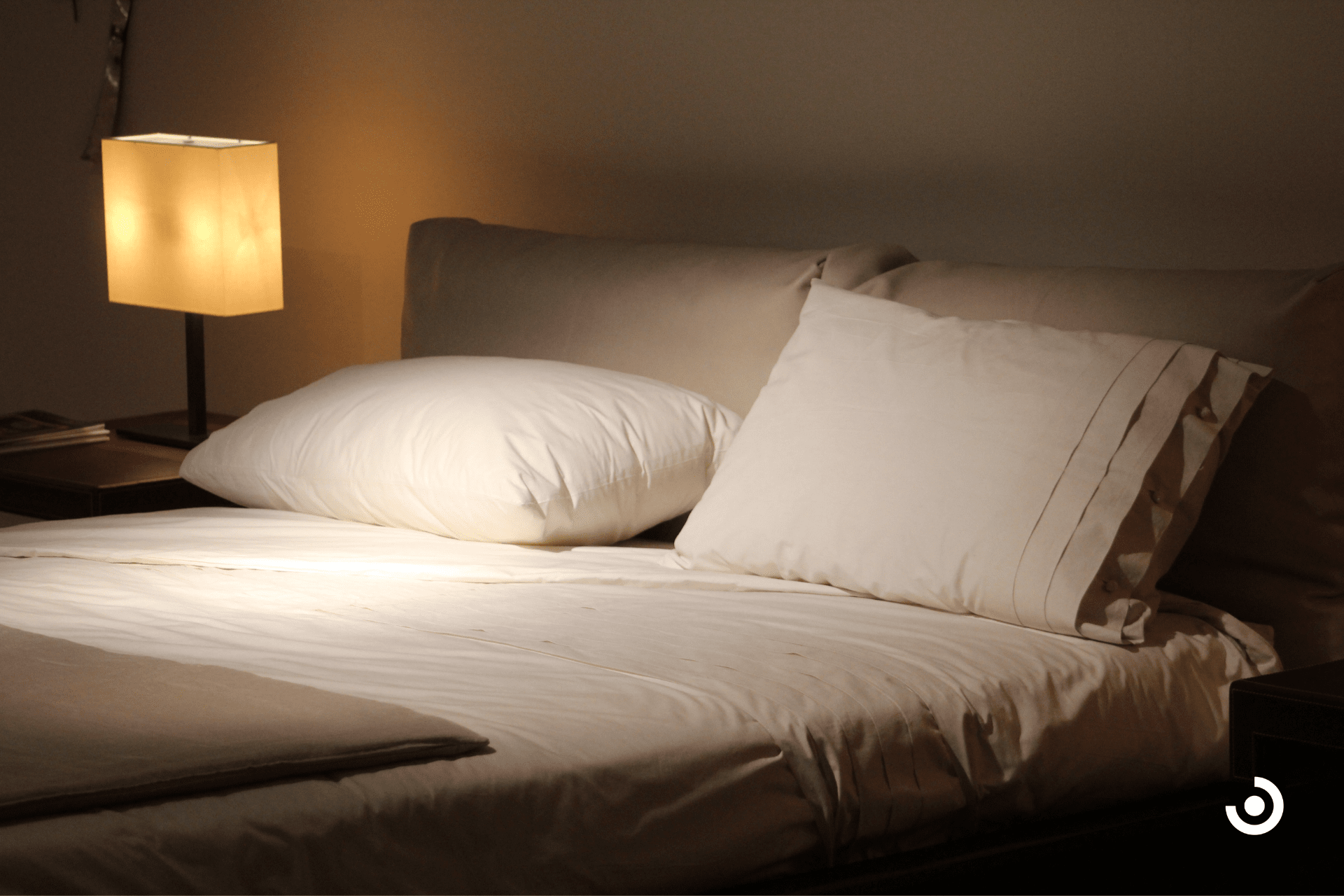Understanding The Impact Of Cannabis On REM Sleep
by Ayesha Aziz · March 12, 2024
Unveiling the Secrets of Cannabis and REM Sleep: Learn how this powerful plant can affect your sleep quality and discover surprising impacts on your REM cycle. Dive into the science behind it and optimize your sleep routine today!

Have you ever wondered about the mysterious world of dreams? They are like a portal to our subconscious mind, where thoughts and emotions intertwine in a surreal landscape.
At the heart of this fascinating realm lies REM sleep, a stage that plays a crucial role in our sleep cycle. But did you know that cannabis, a widely used psychoactive substance, can impact this important stage of sleep?
In this article, we will delve into the depths of understanding the impact of cannabis on REM sleep, exploring the effects, benefits, considerations, and risks associated with its use.
Symbolically, REM sleep can be seen as the bridge between the conscious and subconscious mind, a gateway to our innermost thoughts and desires. It is during this stage that our brain becomes more active, and our eyes move rapidly beneath our closed eyelids as if chasing the fleeting images of our dreams.
However, the use of cannabis has been found to influence this delicate dance of the mind. As you journey deeper into the article, you will uncover the research findings that shed light on how cannabis affects sleep patterns, particularly REM sleep.
But rest assured, there is more to this story than meets the eye. As we uncover the potential benefits of cannabis for sleep disorders, you will discover a glimmer of hope for those seeking a restful night’s sleep.
So, join us on this enlightening exploration, as we unravel the impact of cannabis on REM sleep and find a path towards a more fulfilling slumber.
Key Takeaways
- Cannabis has potential benefits for sleep disorders, but caution should be exercised in its use.
- High doses of cannabis can decrease REM sleep, affecting dream recall and cognitive function.
- Regular and long-term cannabis use can lead to tolerance buildup and dependence on cannabis for sleep.
- The method of consuming cannabis can have varying effects on sleep patterns.
The Role of REM Sleep in the Sleep Cycle
REM sleep, renowned for its role in rejuvenating the mind and repairing memories, remains a remarkable stage in the sleep cycle. It’s during this phase that our brains become highly active, almost as if they’re awake, while our bodies remain still. This is when our most vivid dreams occur, allowing us to explore new worlds and possibilities.
But REM sleep isn’t just about dreaming; it serves a crucial purpose in maintaining our overall well-being. During REM sleep, our brains consolidate and process information, helping us to retain and recall memories. It’s believed that this stage of sleep is essential for learning and creativity, as it allows our brains to make connections and form new neural pathways.
Additionally, REM sleep is vital for emotional regulation and mental health. It’s during this stage that our brains process and make sense of our emotions, helping us to navigate and cope with the challenges of daily life.
Understanding the importance of REM sleep can provide valuable insights into the impact of cannabis on our sleep patterns. As cannabis use has been found to suppress REM sleep, it may affect our ability to consolidate memories and process emotions effectively. This could have significant implications for individuals who rely on REM sleep for optimal cognitive functioning and emotional well-being.
Further research is needed to fully understand the impact of cannabis on REM sleep and its potential consequences for overall sleep quality and mental health.
The Effects of Cannabis on Sleep Patterns
Additionally, when you use cannabis, it can have an impact on your sleep patterns. Research has shown that cannabis use can lead to a decrease in REM sleep, which is an important stage of the sleep cycle. REM sleep is when you typically experience vivid dreams and your brain is highly active. This stage is crucial for memory consolidation and emotional regulation.
So, when cannabis disrupts REM sleep, it can potentially affect your cognitive function and emotional well-being.
Furthermore, cannabis has also been found to increase the amount of deep sleep you get. Deep sleep is the stage of sleep where your body repairs and rejuvenates itself. It is essential for physical recovery and overall health. So, while cannabis may reduce REM sleep, it seems to make up for it by promoting longer periods of deep sleep.
However, it’s important to note that the effects of cannabis on sleep can vary from person to person. Some individuals may find that cannabis helps them sleep better, while others may experience negative effects such as grogginess or difficulty waking up in the morning.
In conclusion, the use of cannabis can alter your sleep patterns, particularly by reducing REM sleep and increasing deep sleep. While this may have some benefits, it’s important to be aware of the potential consequences and to listen to your body. If you’re using cannabis for sleep, pay attention to how it affects your sleep quality and overall well-being.
It may be helpful to consult with a healthcare professional to ensure you’re using cannabis in a way that promotes healthy sleep.
Research Findings on Cannabis and REM Sleep
You may be surprised to learn that research has revealed intriguing findings about the effects of cannabis on the rapid eye movement (REM) stage of sleep. While many people believe that cannabis can help with sleep, the impact it has on REM sleep is not as straightforward as one might think. Here are some key research findings that shed light on the relationship between cannabis and REM sleep:
- Reduced REM sleep duration: Studies have shown that cannabis use can lead to a decrease in the duration of REM sleep. This stage of sleep is important for cognitive function and memory consolidation, so a reduction in REM sleep may have negative effects on these areas.
- Suppressed REM sleep behavior disorder: On the other hand, cannabis is effective in suppressing REM sleep behavior disorder (RBD). RBD is a sleep disorder characterized by vivid and potentially harmful dream-enacting behaviors. Cannabis has shown promise in reducing the frequency and intensity of these episodes.
- Delayed REM sleep onset: Research suggests that cannabis use can delay the onset of REM sleep. This means that it may take longer for individuals who use cannabis to enter the REM stage of sleep. This delay could disrupt the natural sleep cycle and potentially affect overall sleep quality.
- REM rebound: When cannabis use is discontinued, some individuals may experience a rebound in REM sleep, leading to an increase in the duration and intensity of REM sleep. This rebound effect can result in vivid dreams and potentially disrupt the sleep cycle.
Understanding the impact of cannabis on REM sleep is crucial for those who use or are considering using cannabis as a sleep aid. While it may have some benefits, it is important to be aware of the potential effects on REM sleep duration, onset, and rebound. If you have concerns or questions about how cannabis may affect your sleep, it’s always best to consult with a healthcare professional who can provide personalized advice and guidance.
Potential Benefits of Cannabis for Sleep Disorders
If you’re struggling with sleep disorders, cannabis may offer potential benefits. Many people who have difficulty falling asleep or staying asleep have found relief with the use of cannabis.
This natural plant has been used for centuries as a sleep aid, and recent research suggests that it may have a positive impact on sleep disorders.
One potential benefit of cannabis for sleep disorders is its ability to promote relaxation and reduce anxiety. Many sleep disorders, such as insomnia, are often accompanied by high levels of stress and anxiety, which can make it difficult to fall asleep.
Cannabis contains compounds called cannabinoids, which interact with receptors in the brain to reduce anxiety and create a sense of calm. By reducing anxiety, cannabis may help individuals with sleep disorders to relax and fall asleep more easily.
Another potential benefit of cannabis for sleep disorders is its ability to improve the quality of sleep. Research has shown that cannabis use can increase the amount of time spent in deep sleep, also known as REM sleep. This is the stage of sleep when the brain processes and consolidates memories, and it is essential for overall cognitive function and well-being.
By increasing the amount of REM sleep, cannabis may help individuals with sleep disorders to experience more restful and restorative sleep.
Overall, if you’re struggling with sleep disorders, cannabis may offer potential benefits. By promoting relaxation and reducing anxiety, cannabis may help individuals with sleep disorders to fall asleep more easily. Additionally, by improving the quality of sleep and increasing the amount of REM sleep, cannabis may help individuals with sleep disorders to experience more restful and restorative sleep.
However, it’s important to note that cannabis affects each individual differently, and it’s always recommended to consult with a healthcare professional before using cannabis as a sleep aid.
Considerations and Risks of Cannabis Use for Sleep
Consider the potential risks and factors to keep in mind when using cannabis to improve your sleep, as it can be compared to walking on a tightrope without a safety net. While cannabis has been shown to have potential benefits for sleep disorders, it is important to approach its use with caution. One of the main considerations is the impact of cannabis on REM sleep, which is a crucial stage of the sleep cycle. REM sleep is associated with dreaming and cognitive processing, and disruptions to this stage can have negative effects on memory, learning, and overall cognitive function.
To further understand the impact of cannabis on REM sleep, let’s take a closer look at some key factors to consider:
| Factors to Consider | Potential Risks |
|---|---|
| Dosage | High doses of cannabis can lead to a decrease in REM sleep, which may result in reduced dream recall and cognitive impairment. It is important to find the right dosage that allows for improved sleep without negatively affecting REM sleep. |
| Frequency of Use | Regular and long-term cannabis use can lead to a tolerance buildup, which may require higher doses to achieve the same sleep-inducing effects. This can potentially disrupt REM sleep and lead to dependence on cannabis for sleep. |
| Method of Consumption | Different methods of consuming cannabis, such as smoking, vaping, or ingesting edibles, can have varying effects on sleep. Smoking and vaping can have a quicker onset of effects, but the duration may be shorter. Edibles, on the other hand, may take longer to kick in but can provide a longer-lasting sleep aid. |
| Individual Sensitivity | Each person may react differently to cannabis, and individual sensitivity can play a role in its impact on REM sleep. Factors such as age, overall health, and genetic predisposition can influence how cannabis affects sleep patterns. |
As you navigate the potential benefits and risks of using cannabis to improve your sleep, it is crucial to consider these factors and work with a healthcare professional to find the best approach for your individual needs. While cannabis may offer some relief for sleep disorders, it is important to prioritize overall sleep health and consider alternative methods or therapies that can help improve your sleep without compromising REM sleep and cognitive function.
Frequently Asked Questions
Can cannabis help improve the quality of REM sleep?
Yes, cannabis has the potential to improve the quality of your REM sleep. It can help you fall asleep faster, stay asleep longer, and experience fewer disruptions during this important stage of sleep.
Is there a specific dosage or strain of cannabis that is more effective for enhancing REM sleep?
To enhance REM sleep, you’ll need a specific strain or dosage of cannabis. Imagine a strain so powerful, that it lulls you into a deep slumber, transporting you to a dreamland of blissful rest. It’s out there, waiting to serve you.
Are there any potential long-term negative effects of using cannabis to enhance REM sleep?
Using cannabis to enhance REM sleep may have potential long-term negative effects. It can disrupt normal sleep patterns, leading to dependence and withdrawal symptoms. It’s important to explore alternative methods and consult a healthcare professional for personalized guidance.
Can cannabis be used as a treatment for specific sleep disorders that are related to REM sleep disturbances?
Yes, cannabis has shown potential as a treatment for certain sleep disorders that are linked to REM sleep disturbances. It can help improve the quality of sleep and alleviate symptoms, providing relief for those affected.
Are there any alternative methods or treatments that can be used to improve REM sleep without the use of cannabis?
Looking to improve your REM sleep without cannabis? There are alternative methods you can try! Consider practicing good sleep hygiene, such as establishing a regular sleep schedule, creating a relaxing bedtime routine, and creating a comfortable sleep environment.
Last Updated: August 8, 2024
Get Approved for Your Medical Marijuana Card in Minutes!

Get Your Medical Card
Connect with a licensed physician online in minutes

Like This Article?
Share with your friends
Table of Contents
Keep Reading
-
Dab Pen Maintenance 101: Keep Your Device Running Strong!
Learn the best tips and tricks for dab pen maintenance to ensure a flawless vaping experience! Keep your device running strong with our ultimate guide. Click here now for uninterrupted sessions!
-
Master the Decarboxylation Calculator for Effective Cannabis Use
Master the decarboxylation calculator for optimal cannabis potency and enhanced experiences.
-
Does Smoking Weed Make You Dehydrated
Find out the truth about smoking weed and dehydration. Don’t miss this eye-opening article that reveals the surprising link between cannabis and dehydration. Click here to quench your curiosity!



